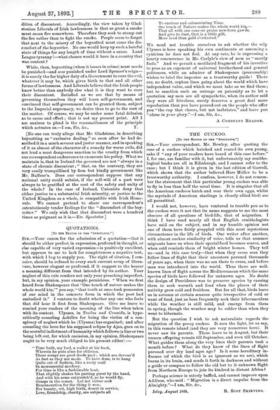THE CUCKOO.
[To THE EDITOR OF THE "Smorrros.1
SIR,—Your correspondent, Mr. Bowley, after quoting the case of a cuckoo which hatched and reared its own young, asks if "any of your readers have heard of this ease before." I, for one, am familiar with it, but unfortunately my ornitho- logical books are all in Edinburgh, and I cannot refer to the case ; but I think it is given in the last edition of Garrell, which shows that the author believed Herr Muller to be a trustworthy authority. I confess, however, I do not remem- ber the statement that this particular young cuckoo was able to fly in less than half the usual time. It is singular that all the American cuckoos hatch and rear their own eggs, whilst the myriads of American starlings (a closely allied bird) are all parasitical.
I would not, however, have ventured to trouble you as to the cuckoo were it not that its name suggests to me the most obscure of all questions of bird-life, that of migration. I think I have read nearly all that English ornithologists have said on the subject, and in my humble opinion not one of them have fairly grappled with this most mysterious circumstance in the life of birds. One writer after another, with almost cuckoo similarity of voice, tells us that summer migrants leave us when their special food becomes scarce, and when cold reminds them of bright winter homes. They tell us—and in this case truly—that when they cross seas they follow lines of flight that their ancestors pursued thousands of years ago, when there was no sea there to cross, and before man was introduced into the world. Thus there are well- known lines of flight across the Mediterranean which the same species of birds have followed for unknown ages. No doubt the design of Providence was to preserve species by causing them to seek warmth and food when the places of their nativity grew cold and fruitless. But for all that, birds leave us in autumn at certain seasons quite irrespective of cold or want of food, just as bees frequently seek their hibernaculum while the weather is still mild, and emerge from them in spring, though the weather may be colder than when they went to hibernate.
But the question I wish to ask naturalists regards the migration of the young cuckoo. It sees the light, let us say, in this remote island (and they are very numerous here). It never saw its parents. These leave us in August, but their unseen offspring remain till September, and even till October. What guides them along the very lines their parents took a month before P What do they know of the lines of flight pursued over dry land ages ago ? Is it some hereditary in- fluence (of which the bird is as ignorant as we are), which burns in its brain, and sends it forth in darkness and without a guide or compass to follow the old but to it unknown flight from Northern Europe to join its kindred in distant Africa P
Perhaps science is utterly baffled, and cannot improve upon Addison, who said : "Migration is a direct impulse from the Almighty."—I am, Sir, &c.,


































 Previous page
Previous page